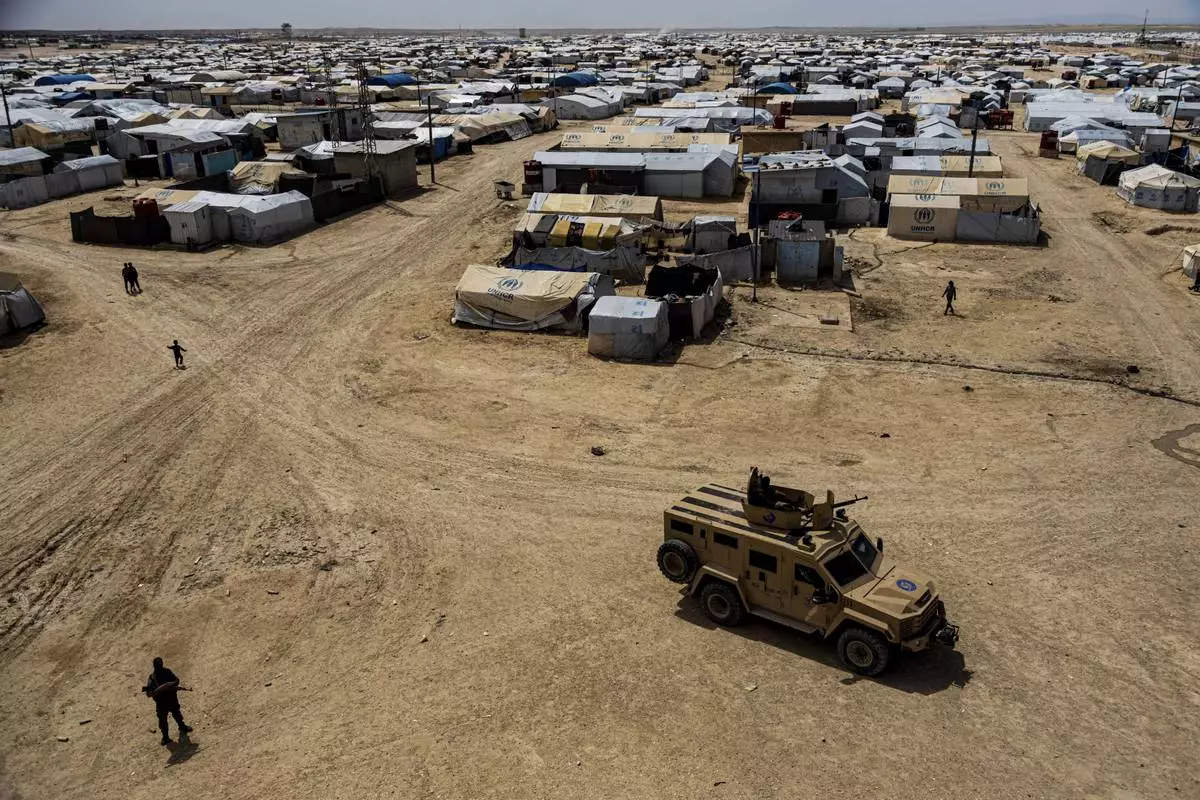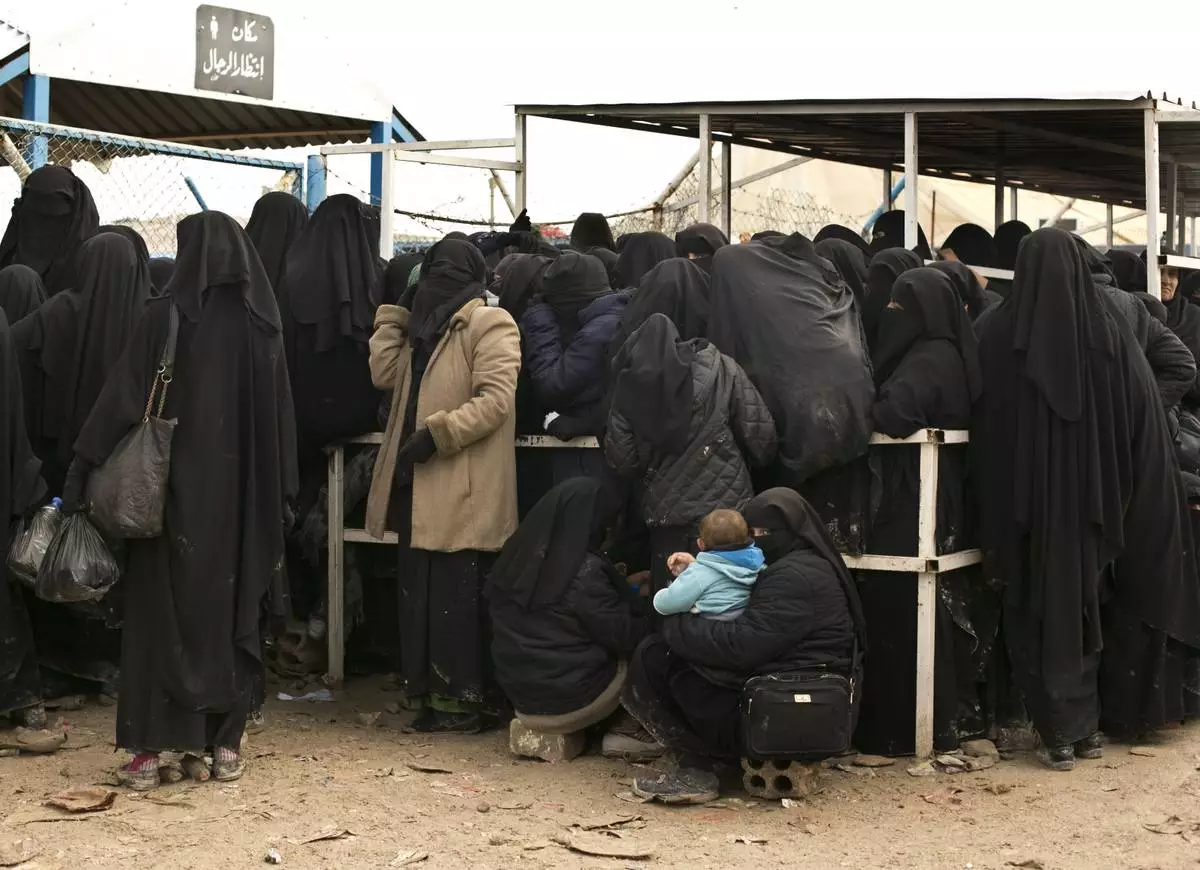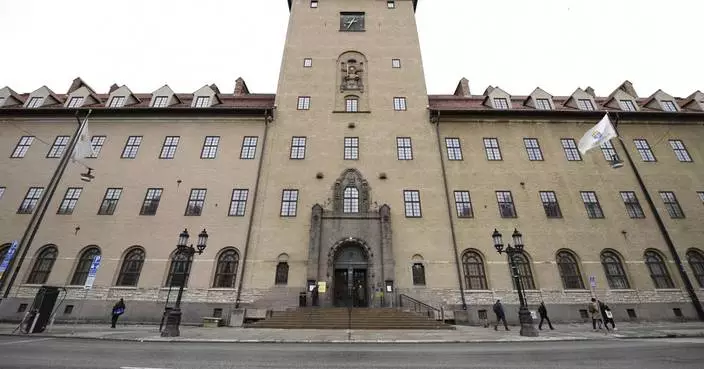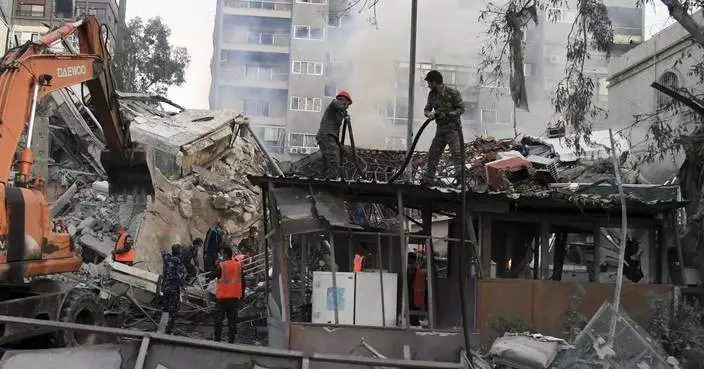Airstrikes in Syria killed more than 100 people on Friday as civilians, weary and many wounded, fled besieged areas for the second straight day.
Syrian government forces stepped up their offensive in the rebel-held eastern suburbs of the capital, Damascus, capturing a major town and closing in on another under the cover of Russia's air power.

This photo released by the Syrian official news agency SANA, shows Syrian troops stand guard near buses carrying Syrian citizens who were fleeing from fighting between the Syrian government forces and rebels, near Hamouria in eastern Ghouta, a suburb of Damascus, Syria, Friday, March. 16, 2018. The government offensive has pushed further into eastern Ghouta, chipping away at one of the largest and most significant opposition bastions since the early days of the rebellion, communities where some 400,000 people are estimated to be holed up. (SANA via AP)
The majority of the deaths occurred in eastern Ghouta, where government forces have been on a crushing offensive for three weeks, capturing 70 percent of the besieged area. The weekslong violence has left more than 1,300 civilians dead, 5,000 wounded and forced thousands to flee to government-controlled areas.
Friday's staggering death toll came a day after Syria passed the seven-year mark in its relentless civil war that has killed some 450,000 people and displaced half the country's population.
The Britain-based Syrian Observatory for Human Rights said bombing and shelling by government and Russian forces killed a total of 76 people in eastern Ghouta, including 64 killed in Kafr Batna and another 12 in Saqba. Government forces also captured the nearby town of Jisreen, it said.
"If the world does not move, Ghouta will be exterminated," said Siraj Mahmoud, a member of the opposition's Syrian Civil Defense search-and-rescue group.
The Observatory said another 36 people were killed in the Kurdish-held town of Afrin in northern Syria, where Turkish troops and Turkey-backed Syrian opposition fighters have been on the offensive since Jan. 20. The dead included nine killed in airstrikes that hit the town's general hospital.

This photo released by the Syrian official news agency SANA, shows Syrian civilians with their belongings as they flee from fighting between the Syrian government forces and rebels, near Hamouria in eastern Ghouta, a suburb of Damascus, Syria, Friday, March. 16, 2018. The government offensive has pushed further into eastern Ghouta, chipping away at one of the largest and most significant opposition bastions since the early days of the rebellion, communities where some 400,000 people are estimated to be holed up. (SANA via AP)
Friday's government attack on Kafr Batna was with cluster bombs, napalm-like incendiary weapons, and conventional explosives, the Observatory said.
Photos and videos released from the area showed charred bodies covered with sheets lined up near what appeared to be shops.
A medical charity supporting hospitals in eastern Ghouta, the Syrian American Medical Society, said doctors in Kafr Batna were treating patients for severe burn wounds.
Oways al-Shami, a spokesman for the Syrian Civil Defense, said the airstrikes targeted a market and a nearby residential area where scores of people had gathered to buy bread and vegetables during a daily truce called by Russia.
"The medical situation is catastrophic. We can't stay in this situation for long," said Dr. Zouhair Kahaleh in the nearby town of Arbeen. Roads were closed, he said, and "we can't treat some of the cases here. It's a major challenge to reach the wounded because of the intensity of the airstrikes."
Exhausted and shell-shocked civilians streamed out of the rebel enclave Friday, a day after tens of thousands evacuated the area in the biggest single-day exodus of the war.
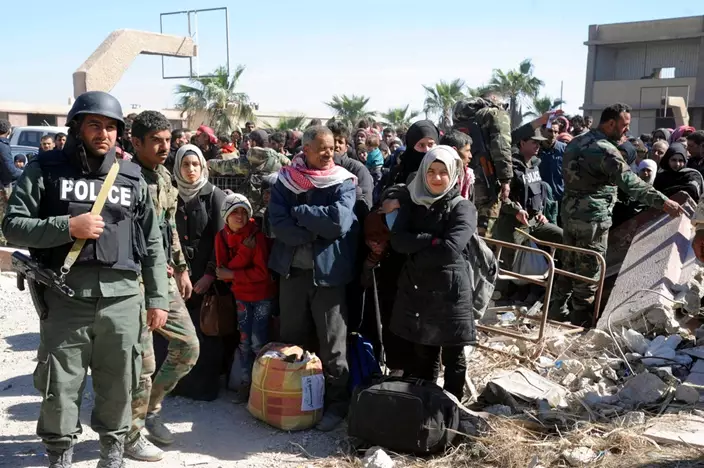
This photo released by the Syrian official news agency SANA, shows Syrian troops stand guard as civilians stand with their belongings after fleeing from fighting between the Syrian government forces and rebels, near Hamouria in eastern Ghouta, a suburb of Damascus, Syria, Friday, March. 16, 2018. The government offensive has pushed further into eastern Ghouta, chipping away at one of the largest and most significant opposition bastions since the early days of the rebellion _ communities where some 400,000 people are estimated to be holed up. (SANA via AP)
Syria's U.N. Ambassador Bashar Ja'afari told the U.N. Security Council that more than 40,000 civilians left eastern Ghouta on Thursday through a new security corridor opened by the government in the recently retaken town of Hamouria. An additional 30,000 people fled the Turkish military offensive on Afrin, according to the Syrian Observatory for Human Rights.
A man interviewed in Hamouria Friday on state-affiliated al-Ikhbariya TV said he had gone two days without food. Others said rebels hoarded food and humiliated civilians, even shooting people trying to leave.
The United Nations has warned of a malnutrition crisis in eastern Ghouta, which human rights groups have blamed on the government's strangling blockade.
Staffan de Mistura, the U.N. envoy for Syria, told the Security Council that although a six-day cease-fire was largely holding in Douma, the largest city in eastern Ghouta, fighting has escalated elsewhere in the rebel-held region where 400,000 people are estimated to be holed up, as well as in Afrin and across many other parts of Syria.
In Afrin, the Turkish military urged civilians to leave and Syrian Kurdish militiamen to surrender to the besieging Turkish forces.

This photo released by the Syrian official news agency SANA, shows Syrian civilians with their belongings as they flee from fighting between the Syrian government forces and rebels, near Hamouria in eastern Ghouta, a suburb of Damascus, Syria, Friday, March. 16, 2018. The government offensive has pushed further into eastern Ghouta, chipping away at one of the largest and most significant opposition bastions since the early days of the rebellion, communities where some 400,000 people are estimated to be holed up. (SANA via AP)
The media office for the Syrian Democratic Forces, a Kurdish-led and U.S.-backed force that operates in the Kurdish autonomous region, said at least 30 people were wounded in Friday's attacks.
Video posted by the Observatory showed victims lying dead in the streets in pools of blood.
Since their January offensive began, Turkish forces have nearly encircled Afrin as they press their campaign to drive the Syrian Kurdish fighters from the town and surrounding region, where tens of thousands of civilians are still believed trapped.
On Friday, Turkish aircraft dropped flyers in Arabic and Kurdish on Afrin, asking residents to stay away from "terrorist positions" — a reference to the Syrian Kurdish fighters — and to not let themselves be used as "human shields."
The leaflets claimed that civilians seeking to flee Afrin would be guaranteed safety by the Turkish military and urged Syrian Kurdish fighters to "trust the hand we extend to you."
"Come surrender! A calm and peaceful future awaits you in Afrin," the leaflets read.
Meanwhile, the U.N. Security Council again demanded a cease-fire throughout Syria and backed a U.N.-endorsed roadmap for a peaceful transition and elections. Members reaffirmed that U.N.-led talks in Geneva "remain the central process to find a political solution."
Mistura, the U.N. envoy for Syria, told the council that he hasn't been able to form a committee to draft a new constitution because President Bashar Assad's government hasn't engaged and "we need to have comprehensive participation of all Syrian parties."
Ministers from Russia, Turkey and Iran also underscored the need for a political solution in a joint statement after a meeting in Astana, Kazakhstan, on Friday and urged international support for de Mistura's efforts to form a constitutional committee.



